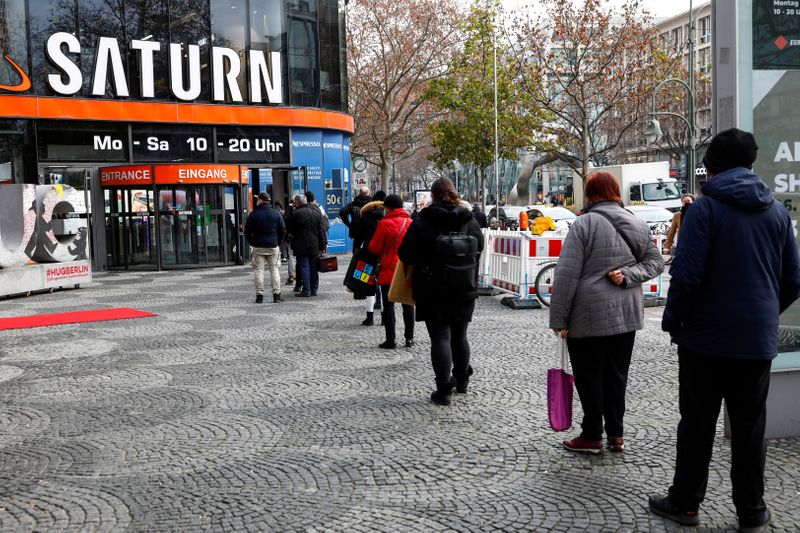By Michael Nienaber
BERLIN (Reuters) - German retail sales plunged more than expected in December as a decision to tighten lockdowns to curb the spread of COVID-19 choked consumer spending in Europe's largest economy at the end of the year, data showed on Monday.
Chancellor Angela Merkel and state premiers closed most shops and services from mid-December after a partial lockdown for bars, restaurants and entertainment venues introduced in early November failed to push down infections.
The stricter lockdown, which included schools and kindergartens but excluded factories and offices, has been extended until mid-February.
The Federal Statistics Office said retail sales fell by an unprecedented 9.6% on the month in real terms after a downwardly revised increase of 1.1% in November.
This undershot a Reuters forecast for a drop of 2.6% and marked the steepest monthly drop since records began in 1994, the office said. December is usually the best month for German retailers.
"The containment measures left massive scars in December. Compared to November, sales dropped by an alarming extent," VP Bank analyst Thomas Gitzel said.
On the year, retail sales - a notoriously volatile indicator often subject to revisions - rose 1.5% in real terms following a downwardly revised increase of 5% in November.
ONLINE SALES BENEFIT
For 2020 as a whole, retail sales jumped by 3.9% on the year in real terms, the office said. That was slightly below a previous estimate of 4.1% but still marked the highest annual increase on record.
Online retailers continued to benefit from shifting consumer habits with a strong jump in sales. That came at the expense of clothing and shoe stores ,which continued to suffer.
The HDE retail association has warned that up to 50,000 shops are facing bankruptcy because of the lockdown and the broader shift towards online retailing.
The weaker-than-expect retail sales data followed a consumer sentiment survey by GfK research group last week, which showed that German consumer morale fell a fourth month in a row heading into February as the stricter lockdown kept people from going shopping.
The Ifo economic institute said on Monday that the number of workers on reduced hours as part of the 'Kurzarbeit' job protection scheme rose by almost 20% to 2.6 million in January as a result of the stricter lockdown.
Germany's uneven lockdown has created a two-speed economy in which export-oriented manufacturers are doing well while domestically driven services are suffering.
"Since the lockdown is likely to continue for some time, a significant improvement cannot be expected for the time being," Commerzbank (DE:CBKG) economist Ralph Solveen said, adding the economy was likely to shrink significantly in the first quarter of 2021.
Robust exports and construction activity helped the economy eke out 0.1% growth in the final quarter of last year despite the phased lockdown.

A survey by IHS Markit among purchasing managers showed on Monday that increasing supply delays threaten to slow Germany's manufacturing. It nonetheless remained in growth territory in January despite the harder lockdown.